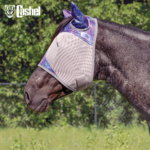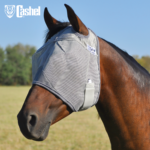Fall — It’s that time of year again when the seasons shift, days are shorter and colder, and your American Quarter Horse?s coat gets longer.

While some horse owners are settling down for the season, others are gearing up for their biggest competitions of the year ? the All American Quarter Horse Congress and the AQHA World Championship Show.
Unfortunately, this can be the time of year when upper respiratory disease such as equine influenza virus rears its ugly head. Equine influenza virus is one of the most common infectious diseases affecting the respiratory tract in horses.
Equine influenza is a virus of the H3N8 subtype. Two different equine H3N8 subtypes appear to be circulating internationally1. It is important to note that these equine flu strains are different than the flu strains affecting humans.
Equine influenza is contagious and can be spread primarily by a couple of different means. The first is through respiratory tract secretions. Coughing horses can release the virus into the air, where it can spread up to 30 to 50 meters1. It can also be spread by direct contact between horses and indirectly via a person?s hands or clothing or on inanimate objects such as buckets, tack or lead ropes1. Flu symptoms in horses may include elevated body temperatures, loss of appetite, harsh dry cough, depression and nasal discharge.
The best method for helping protect horses against equine influenza is to have them vaccinated by a veterinarian. According to the American Association of Equine Practitioners vaccination guidelines, adult horses, previously vaccinated against equine influenza, should be revaccinated at six-month intervals. This includes performance, show or pleasure horses constantly at risk of exposure2. In other words, even if your horse was vaccinated against equine influenza virus in the spring, he may require a booster in the fall. For further vaccination guidelines, horse owners should consult their local veterinarian, as guidelines may vary between parts of the country, age and use of the horse.
Another option to help bolster immunity is the use of immunomodulators, which can help a horse’s immune system function more efficiently against certain diseases. An example of an immunomodulator is ZYLEXIS, an inactivated (killed) Parapox Ovis Virus that stimulates the horse’s immune system to aid in the reduction of equine upper respiratory disease associated with equine herpesvirus Type 1 and Type 4 infections. When administered prior to exposure to stressful situations, ZYLEXIS can help stimulate a horse’s immune system to function more efficiently against EHV types 1 and 4 infections.
A healthy immune system helps horses combat travel stress and being in an unfamiliar environment where they may encounter horses shedding upper respiratory viruses. Supplementing feed with electrolytes can aid in electrolyte rehydration if horses become finicky about drinking water away from home. Work with your veterinarian to prepare a wellness plan for your horses based on travel plans and other factors ? the best protection is to maintain your horses? health and limit the risk of exposure to disease.
For more tips on keeping your horse healthy this influenza season, go to America’s Horse Daily.





